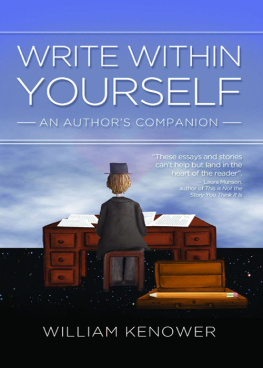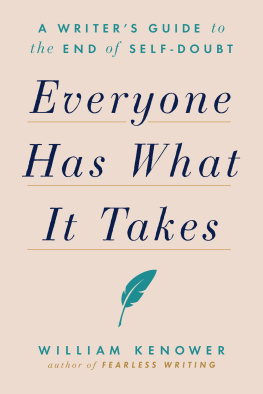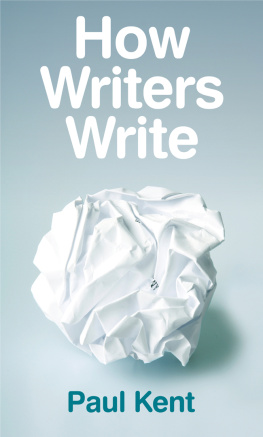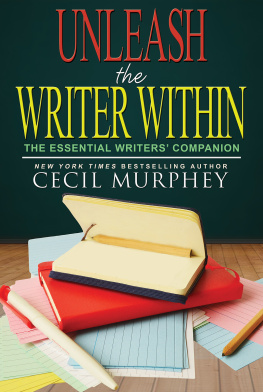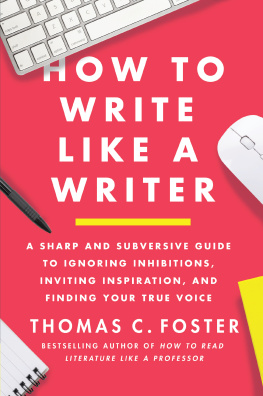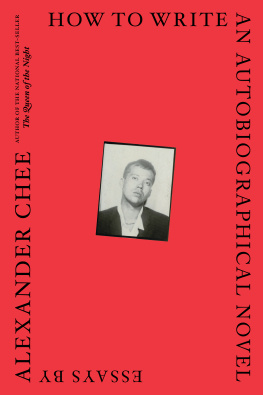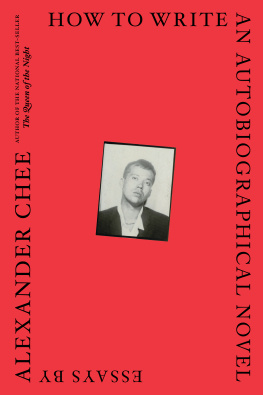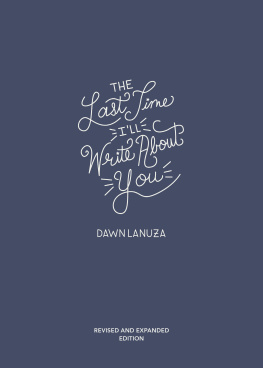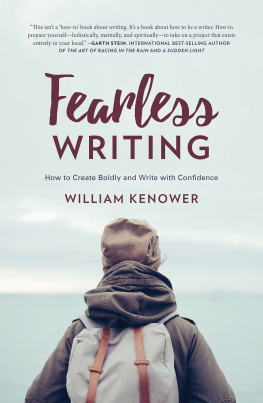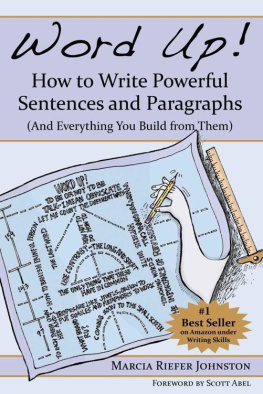Copyright 2013 William Kenower

This work is licensed under a Creative Commons Attribution-Noncommercial-No Derivative Works 3.0 Unported License.
Attribution You must attribute the work in the manner specified by the author or licensor (but not in any way that suggests that they endorse you or your use of the work).
Noncommercial You may not use this work for commercial purposes.
No Derivative Works You may not alter, transform, or build upon this work.
Inquiries about additional permissions should be directed to:
Cover Design by Greg Simanson
Cover Image by Jennifer Paros
PRINT ISBN 978-1-62015-124-2
EPUB ISBN 978-1-62015-114-3
For further information regarding permissions, please contact
.
Library of Congress Control Number: 2013933920
For Jen:
Because every book
should begin in love.
CONTENTS
ACKNOWLEDGMENT
I would like to thank the Pacific
Northwest Writers Association for their
enthusiastic support of a guy who really
didn't know what he was doing
WRITE WITHIN YOURSELF
MANY YEARS AGO I READ AN ARTICLE about the American middle distance runner Alan Webb, whose high school coach described him as having the ability to run within himself. This is a high compliment for a runner, signifying that while training, the athlete runs neither too fast nor too slow, having become so attuned to his own body that he can confidently and even comfortably push himself to the furthest edge of his stamina.
Reading this, I thought, That's how I want to write. Lately, I had begun to feel as if I were leaving myself while writing. I suppose I was headed off in search of what I should write about or, worse yet, some proof that what I was writing was good. This was a very uncomfortable way to write, and the more I thought about it, an equally uncomfortable way to live. Yet there seemed to be no easy trick to keep my attention where it needed to be. My attention could wander as quickly as thought, and soon there I'd be, not writing, only wandering, having already forgotten how I became so lost.
This book is not a guide, but a companion. A guide would tell you where to go. As a writer, only you can ever know that. A good companion, however, can remind you that not only aren't you alone, but that forgetting where you want to go is different than not knowing where you want to go.
I hope these little essays and stories will help remind you that you have always known where you want to go. It's true, you know. But knowing something is not the same as acting on it. If you are like me, you can never be reminded often enough what it feels like to write and live within yourself. If you are like me, the temptation to leave yourself and chase the siren song of praise or run from the hounds of criticism remains. No matter. If my life has taught me anything, it is that there is neither such a thing as too far from myself nor such a thing as too close. The door to our heart remains ever open to our attention, and once within it, we can travel as deeply as we wish, that well-being the only channel through which life is ever known.
WHAT WE WANT MOST
WHEN BOOK PEOPLE, either professional or casual enthusiasts, get together, they often find themselves talking about great books. Hemingway said he knew he had read a great book if he felt changed after reading it. I think everyone who reads regularly has experienced this. However, whether the great books you talk about are your own personal list, or the canon with which we're all familiar, I would encourage you not to discuss them as if they were somehow a triumph of craft. I have nothing against craft, I edit a magazine full of articles on craft, but a book that stays with us for years after we've read it is much more than mere craft. In almost every case, great books are the result of three things: people who love to write, writing what they most want to write, in the way they most want to write it.
A great book is a work of lovenot craft, not intelligence, not discipline, but love. And that love expresses itself in this question asked and answered over and over again: What do I most want to say? A sentence can be grammatically correct, it can be intellectually correct, but if it is not what the author most wanted to say, then it is incorrect. Every day when writers sit down to write, they must ask themselves this question of, What do I most want to say? over and over again.
You can try to ask yourself, What should I write that will sell a lot of books? or, What should I write that will win me a lot of awards? but these questions, tempting and even practical as they seem, are unanswerable. The answers to these questions lie in the hearts of other people, in a writer's potential readers or critics or agents and editors. I can no more know what anyone else desires most in a book, than anyone else can tell me what I most want to write. Whether we like it or not, we are all choosing our own way, and the sovereignty of the soul, of the heart, is absolute. There is no one in the world who can tell us, even if we wanted them to, what we most want. We always have to go find that answer ourselves. And sometimes we find it in the books we write, and in the books we read.
For instance, Deb Caletti told me that when she decided at the age of thirty-two that it was finally time to pursue what was literally a life-long dream of being a writer, she posted a quote by Nietzsche on the wall she faced while writing. The quote read, Become the person you are. Not, You will sell a half million copies of your first book. Not, You are a great writer. It was, Become the person you are, because she felt that by choosing not to write, as she had for many years, she was avoiding who she truly was. She was avoiding herself. And by going into herself and locating what she most wanted to dowriteshe had also located the source for the answer to the question, What do I most want to write? And as she answered this question, book-by-book, page-by-page, word-by-word, she was guiding herself toward who she was. She was taking the only route available, by asking the question, what do I most want, what do I most want, what do I most want?
Life, and well-being, is really as simple as that, except for this one small detail: that question remains the most courageous, the most meaningful, and also the most frightening question you will ever answer. If you answer it authentically, there is a good chance you will be pointed in a direction that no one you know has ever traveled before. If you answer it authentically, you may be steered away from family and friends. And as a writer, if you answer it authentically you may see a combination of words on the page that you have never read before, which is both exhilarating and frightening. What if nobody likes it? What if no one will publish it? What if the reviews stink? You don't get to know. Because if you answer this question authentically, you are inevitably guided toward the unknown.
When I had arrived at a point in my life where I knew it was time to reach out to the local writing community, I went to the poet and novelist David Wagoner who teaches at Richard Hugo House in Seattle and showed him something of mine. He read it, and then asked me what I wanted to do, and I told him I wanted to write books, and he said, I wish you well. It's a lonely road.
And it is sometimes, but it would be far lonelier if I were the only one on it. There is a reason the Hero's Journey is an enduring story archetype. And there is a reason we share these stories of a hero going on a journey of discovery into the unknown. We don't share these stories to learn the way. No story, no teacher, no friend, can show us the way, because they cannot answer the question of what we want most. I believe everyone wants nothing more than to answer this question authentically, but we are all frightened at one point or another to do so; or we believe that pursuing what we love most is somehow meaningless or trivial or even selfish. But I also believe that a really good story reminds us that this journey is meaningful and worth it, and often that's all we need to once again answer the question, What do I want most?

